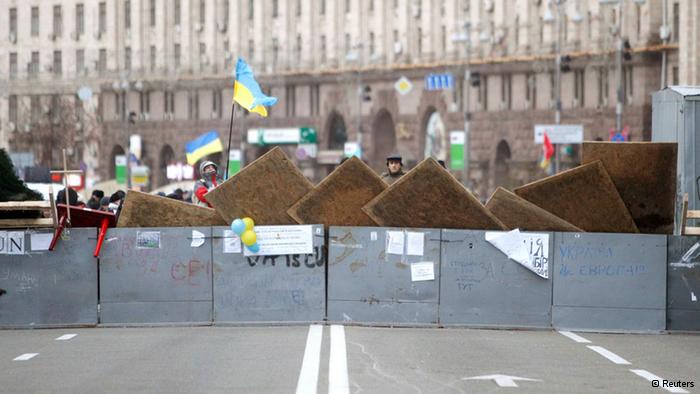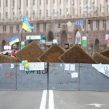
Moscow Plays the Chechen Card in Ukraine
Publication: Eurasia Daily Monitor Volume: 11 Issue: 25
By:

For the past several days, those hostile to the Ukrainians protesting against President Viktor Yanukovich on Maidan Nezalezhnosti (Independence Square) in Kyiv spread rumors alleging the presence of Chechens in the ranks of the opposition (https://pravdatoday.info/content/zulihan-tut-nastoyashchaya-geopoliticheskaya-bitva-ishod-kotoroy-zatragivaet-i-nas).
While this rumor might have been disregarded as a bad joke, the Russian media has started to circulate these reports. The notorious Russian news agency Lifenews, which is known for its special relationship with the Russian security services and regularly runs leaks from them, also reported the rumor of Chechens in Maidan. According to the agency, four North Caucasian militant instructors were dispatched to Ukraine to train the Ukrainians on how to engage in urban warfare. Lifenews reported that the instructors arrived in Ukraine in mid-December and have trained 115 Ukrainians in such things as how to work with explosives and make explosives out of commonly accessible materials. Another ten individuals were allegedly trained to organize and coordinate riots. The remaining people purportedly trained by the Chechens were given auxiliary support roles, according to the report. The training was done at a specially equipped camp in Ukraine. The Russian news agency did not take into account that the Chechens hardly could teach the Ukrainians anything. Making a Molotov cocktail requires no special training, and no other explosive materials have been used by the opposition since the start of the protests (https://lifenews.ru/news/126485).
Chechen nationalist poet Zulikhan Magomadova, who has been blogging from Kyiv, also sparked negative emotions toward Chechens among those who oppose the Ukrainian uprising (https://polemika.com.ua/news-137423.html). According to Magomadova, she arrived in Kyiv to support the Ukrainians’ struggle because she considered these events to be of geostrategic importance that will have an impact on the Chechens (https://zulikhan.livejournal.com/183488.html). Magomadova wrote that she was in Kyiv with her husband Abubakar Magomadov, former head of the Defense Committee in the parliament of the separatist Chechen Republic of Ichkeria.
Amina Okueva is another Chechen woman who has also been criticized by the opponents of the Ukrainian uprising (https://www.facebook.com/Amina.Okueva/about). Okueva is the spouse of Adam Osmaev, who was accused of organizing an attempt on the life of President Vladimir Putin (https://lenta.ru/lib/14216586/). As a professional nurse, Okueva assisted people injured in the violence in Kyiv, which was also perceived as support by Chechen radicals for the protesters at Maidan. The media recast her as a Salafi (https://www.facebook.com/photo.php?fbid=519616734823492&set=a.256803501104818.58249.100003255096961&type=1&theater), even though the struggle for her husband left her little choice but to move toward religion.
The rumors about the presence of Chechens in Ukraine are supported by the statements of those few Ukrainians who went to Chechnya and took part in the Russian-Chechen war of 1994–1996. One of them, Sashko Bily, was the commander of the Ukrainian nationalist organization Ukrainian National Assembly–Ukrainian National Self Defense (UNA-UNSO) in Chechnya at the time. Bily now strolls through Independence Square dressed in his uniform, which has the inscription “The Army of General Dudaev” (https://twitter.com/_Ramzan_/status/430948912669949952/photo/1). This inscription, in fact, did not belong to the actual Chechen separatist army, but to the military unit that was formed by Salman Raduev. Raduev was killed in 2002 in a Russian prison where he was serving a life sentence for fighting the Russian army.
Chechen media representing a large Chechen diaspora estimated at 150,000 or more people in the West have also supported the Ukrainian opposition (https://www.chechenews.com/world-news/politics/16279-1.html). The events in Ukraine remind Chechens of their common struggle against Soviet totalitarianism and of those who fought against Russia in the Russian-Chechen war. However, this type of support has not been well received by Ukrainian protesters. They worry that a large portion of the population may swing to the government side because of concerns about Chechen Islamic radicals. Supporters of the Ukrainian opposition themselves fear “invaders” from the south, having discussed the possibility that the government may use North Caucasians against them as a backup force for the local police (https://news24ua.com/evromaydan-gotovitsya-otbivatsya-ot-chechencev).
It is, therefore, not surprising that the Ukrainian authorities have practically closed the border to Chechens. When a group of visitors tried to enter Ukraine en route to Europe in January, four Russian citizens of Chechen ethnicity were stopped by the border guards in Donetsk (https://www.62.ua/news/457934). The Ukrainian authorities explained their decision not to allow the Chechens to enter Ukrainian territory by the fact that they had different destinations, even though it is unclear why all four should have been traveling to the same place. The authorities are apparently going out of their way to prevent Chechens from entering Ukraine.
The rumors about the presence of Chechen militants in the ranks of the Ukrainian opposition may be linked to the activities of a Chechen who is well-known in Ukraine—Vladislav Surkov, who is now Vladimir Putin’s aide for coordinating socio-economic cooperation with Commonwealth of Independent States (CIS) countries, as well as Abkhazia and South Ossetia. Ukrainian media has reported that one of Surkov’s closest associates, Boris Rapoport, has been appointed as the person directly responsible for Ukraine in the Russian presidential administration (https://ipress.ua/ru/news/kreml_naznachyl_pomoshchnyka_surkova_otvetstvennim_za_sozdanye_ukraynskogo_fronta__smy_44044.html). Knowing the character and tactics of Vladislav Surkov, it can be assumed that Rapoport’s appointment is simply a way for the Kremlin to camouflage its decision to send in its heavyweight politician. Surkov has a strategy and tactics for Ukraine modeled on what he did in the North Caucasus and Georgia during the 13 years since the start of the second Russian-Chechen war in 1999.
If, in fact, Surkov is behind Russian policymaking in Ukraine, the appearance of the Chechen theme in Ukraine is no accident. After this, he will strike the eastern part of Ukraine, forcing Kyiv to become nervous about the areas adjacent to Russia and the Crimean peninsula, which have a predominantly ethnic Russian population.
The Chechen theme in Ukrainian affairs is an attempt to discredit those forces in the country that are unhappy with Russian policies and want closer contacts with the West. So, the Chechens have become a geopolitical issue by themselves, as their involvement in Georgia, Syria, Egypt, Turkey, Europe and the US raises multiple questions based on a false perception of the essence and character of the Chechen resistance.




